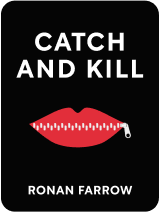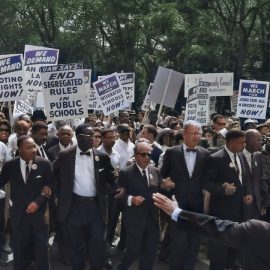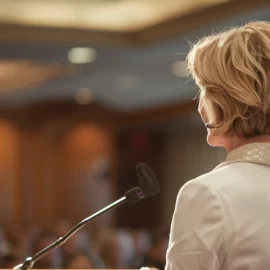

This article is an excerpt from the Shortform book guide to "Catch and Kill" by Ronan Farrow. Shortform has the world's best summaries and analyses of books you should be reading.
Like this article? Sign up for a free trial here .
What caused Ronan Farrow to investigation into Harvey Weinstein? Who were his sources and what did he uncover?
In 2017, Ronan Farrow exposed Harvey Weinstein in his investigative reporting piece published in The New Yorker. In it, he reported stories of 13 women who were sexually assaulted by the producer.
Read more about Ronan Farrow, Harvey Weinstein, and how the story broke.
Ronan Farrow, Harvey Weinstein, and Rose McGowan
In January 2017, Noah Oppenheim, producer for Today and soon to be the president of NBCNews (and, thus, Farrow’s boss) suggested that Farrow talk to Rose McGowan about her rape allegation, believing that there might be a potential bombshell story behind her tweet.
Farrow was intrigued by the idea of doing investigative reporting into the widely alleged show business practice of the “casting couch,” wherein aspiring female stars perform sexual favors for producers and directors, in exchange for being cast in films and TV shows. The McGowan accusation seemed like a good angle to approach this story, so Farrow dove in.
Farrow made contact with McGowan in February 2017. In their phone call, the actress was direct, pointed, and specific in naming Harvey Weinstein as the man who had sexually assaulted her. In a subsequent meeting with Farrow, McGowan detailed exactly what transpired between her and Weinstein.
During the 1997 Sundance Film Festival, McGowan had a meeting with Weinstein that had initially been scheduled at a restaurant. In what Farrow would later learn was his modus operandi for committing sexual assault, the location of the meeting was abruptly changed from the restaurant to Weinstein’s hotel suite. It was at this meeting (which McGowan quickly realized was not a professional meeting at all) that Weinstein raped her.
After hearing from McGowan in February, Farrow was on a mission. He realized that the Weinstein story was explosive—a Hollywood mogul who operated openly as a sexual predator and whose crimes were widely known and sanctioned by seemingly everyone in the entertainment industry.
He was chasing leads, talking to people throughout the film world who knew Weinstein or had worked with him. The stories were always the same: Weinstein committing sexual assault against women and then using his money and power to bully them into silence. Yet almost no one was willing to go on record and use Weinstein’s name in a published piece of reporting. His stranglehold seemed unbreakable.
Ronan Farrow and the Harvey Weinstein Stranglehold
Harvey Weinstein had vast connections throughout the world of media and entertainment that he could use to snuff out any negative story. He was often boastful about his ability to stamp out damaging press coverage and shape the news cycle with a few well-placed phone calls to his contacts. He had at his disposal a powerful and well-oiled intelligence-gathering operation that would tell him which sources were talking to which reporters and which news organizations were working on stories about him. Through his network of attorneys, PR officers, agents, producers, and even hired spies, Weinstein had, for decades, successfully strangled all attempts to bring his misconduct to light.
NBC News was hardly immune to this pressure campaign. Very early on in the Ronan Farrow investigation, Harvey Weinstein’s contacts at the network had informed him that Farrow was working on a story and even identified his sources. In October 2016, he had engaged the services of Israeli private security firm Black Cube—founded and run by former agents of the Mossad, Israel’s national intelligence service. Under contract for Harvey Weinstein, Ronan Farrow’s cell phone was hacked to track his communication with his sources. The purpose of this espionage was to find any possible dirt on the journalist that could be used to blackmail him and discredit his story. Farrow also received cryptic death threats through text messages to his personal phone. It was all part of the Weinstein strategy of intimidation, blackmail, and deception.
I got them to kill the story
Weinstein was also able to exert significant pressure at NBC News, through his connections with Noah Oppenheim, president of NBC News; Phil Griffin, president of MSNBC; and Andy Lack, chairman of NBC News and MSNBC. These were the three most senior figures at NBC News and had the power to stop any story dead in its tracks, and Weinstein had easy and regular contact with all of them.
NBC ordered Farrow to put a “pause” on the story, while the news division sought approval from Comcast—NBC’s parent company. The shoddy rationale they offered to Farrow was that shooting the McGowan interview would constitute tortious interference (encouraging McGowan to violate her NDA).
Again, this made no sense. If there was potential legal trouble for NBC with McGowan, the liability would be in airing her interview, not in merely shooting it. They could always decide to cut it before the package went to air. But NBC was insistent that the story come to a halt until these “issues” could be resolved.
From Farrow’s point of view, the situation was absurd: he was sitting on a major story and his own news network was handicapping his efforts to bring it to light. He and McHugh decided to go against the wishes of their bosses, continuing to schedule further interviews with Weinstein’s accusers. Farrow was committed to the story and was willing to go rogue to see it through.
Weinstein Letter
Although Weinstein was delighted by NBC’s utter capitulation, he was keenly aware that Farrow’s reporting still existed and could be dusted off and revived at any time by future reporters. He was determined to make sure that all evidence of the story was destroyed root-and-branch.
Accordingly, litigation counsel for the Weinstein Company sent a letter to CAA (the agency representing Farrow), making several extraordinary demands. Specifically, Harvey Weinstein demanded that Ronan Farrow hand over all his notes and recordings to NBC, that he surrender the names and contact information of any other news outlets he might be working with, and that he provide written assurance that the reporting had been terminated. The letter also threatened him with a multi-million dollar lawsuit should he publish anything about the Weinstein Company or its employees.
The Story Hits
On October 10, 2017, Ronan Farrow’s Harvey Weinstein story appeared in The New Yorker. It proved to be a bombshell: within hours of the story going live, Farrow had texts and emails from countless strangers, sharing their own stories of sexual abuse at the hands of figures in government, media, business, and law. Farrow had broken open the dam on an ugly aspect of American life that extended to the highest levels of power.
Overnight, Farrow went from being the guy who NBC unceremoniously tossed out to the journalist everyone wanted to book on their show—including his former employers at NBC. At the same time, the network was petrified at the idea of the public becoming aware of their own complicity in covering up the Weinstein story. After all, the publication of such a groundbreaking piece in The New Yorker by someone who had so recently been under contract with NBC raised the question, “Why didn’t NBC run with this?”
The Walls Close in on Weinstein
After The New Yorker published the investigative piece by Ronan Farrow, Harvey Weinstein was fired by the board of the Weinstein Company and the company slid into bankruptcy.
But worse was to come for Harvey Weinstein. Ronan Farrow received many more stories of Weinstein’s sexual abuse from the women who hadn’t been identified in his investigation. Eventually the number grew to 80. He wasn’t merely a boss with a poor understanding of workplace boundaries, as Lisa Bloom’s PR statement had tried to portray him. The weight of the testimony suggested that Weinstein was, in fact, a serial predator and rapist.
Eventually, the NYPD Cold Case Squad contacted Lucia Evans, the marketing consultant who had been assaulted by Weinstein in 2004. They told her that if she filed a complaint, she could help initiate a criminal investigation into the now-disgraced Hollywood producer, one that might send him to prison. Although Evans was fully aware of how harrowing it would be to serve as a witness in a rape trial, she chose to file the complaint. On May 25, 2018, Weinstein was booked in New York on charges of rape and a criminal sex act, being led to the police precinct in handcuffs. In addition, authorities in Los Angeles and London started building cases and he was facing an avalanche of civil claims against him.

———End of Preview———
Like what you just read? Read the rest of the world's best book summary and analysis of Ronan Farrow's "Catch and Kill" at Shortform .
Here's what you'll find in our full Catch and Kill summary :
- How Ronan Farrow uncovered rampant sexual abuse and assault by Harvey Weinstein
- How NBC tried to intimidate Farrow into killing the Weinstein story
- How the media and legal systems let Weinstein's abuse continue for decades






